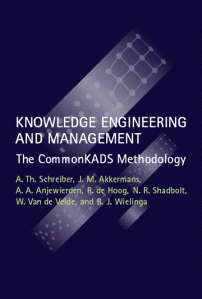Knowledge Engineering (KE)Knowledge engineering is a field of artificial intelligence (AI) that tries to emulate the judgment and behavior of a human expert in each field. It creates rules to apply to data to imitate the thought process of a human expert. It looks at the structure of a task or a decision to identify how a conclusion is reached. Knowledge engineering is the technology behind the creation of expert systems to assist with issues related to their programmed field of knowledge. |
From Google Search Enghine |
|---|---|
|
Knowledge Engineering (KE) refers to all technical, scientific and social aspects involved in building, maintaining and using knowledge-based systems. Web Link https://en.wikipedia.org/wiki/Knowledge_engineering Knowledge-Based System (KBS) is a computer program that reasons and uses a knowledge base to solve complex problems. The term is broad and refers to many different kinds of systems. The one common theme that unites all knowledge based systems is an attempt to represent knowledge explicitly and a reasoning system that allows it to derive new knowledge. Thus, a knowledge-based system has two distinguishing features: a knowledge base and an inference engine. Web Link https://en.wikipedia.org/wiki/Knowledge-based_systems |
From WikiPedia Search Engine


|
Expert SystemsIn artificial intelligence (AI), an expert system is a computer system emulating the decision-making ability of a human expert. Expert systems are designed to solve complex problems by reasoning through bodies of knowledge, represented mainly as if–then rules rather than through conventional procedural code.[2] |
|
Knowledge Engineering and ManagementKnowledge has come to be recognized and handled as a valuable entity in itself. Surveys consistently show that top executives consider knowledge to be the single most important factor in organizational success. In this knowledge-driven society, knowledge systems have their place as an important mainstream technology. That is why there is a strong need to convert the art and craft of knowledge engineering into a real scientific discipline. CommonKADS is the leading methodology to support structured knowledge engineering. It has been gradually developed and has been validated by many companies and universities in the context of the European ESPRIT IT Program. It now is the European de facto standard for knowledge analysis and knowledge-intensive system development, and it has been adopted as a whole or has been partly incorporated in existing methods by many major companies in Europe, as well as in the US and Japan. Web Link https://commonkads.org/ |
 |
Knowledge Management vs Knowledge Engineering.Brian D. Newman © January 5, 1996 The terms knowledge management and knowledge engineering seem to be used as interchangeably as the terms data and information used to be. But if you were to ask either a manager or an engineer if their jobs were the same, I doubt if you would get them to agree they were. A brief examination of the terms management and engineering shows that to manage is to exercise executive, administrative and supervisory direction, whereas, to engineer is to lay out, construct, or contrive or plan out, usually with more or less subtle skill and craft. The main difference seems to be that the (knowledge) manager establishes the direction the process should take, whereas the (knowledge) engineer develops the means to accomplish that direction. Not all that much different from the relationships in any other discipline. Web Link https://www.km-forum.org/kmvske.htm |
Knowledge Management vs Knowledge Engineering.Brian D. Newman © January 5, 1996 |